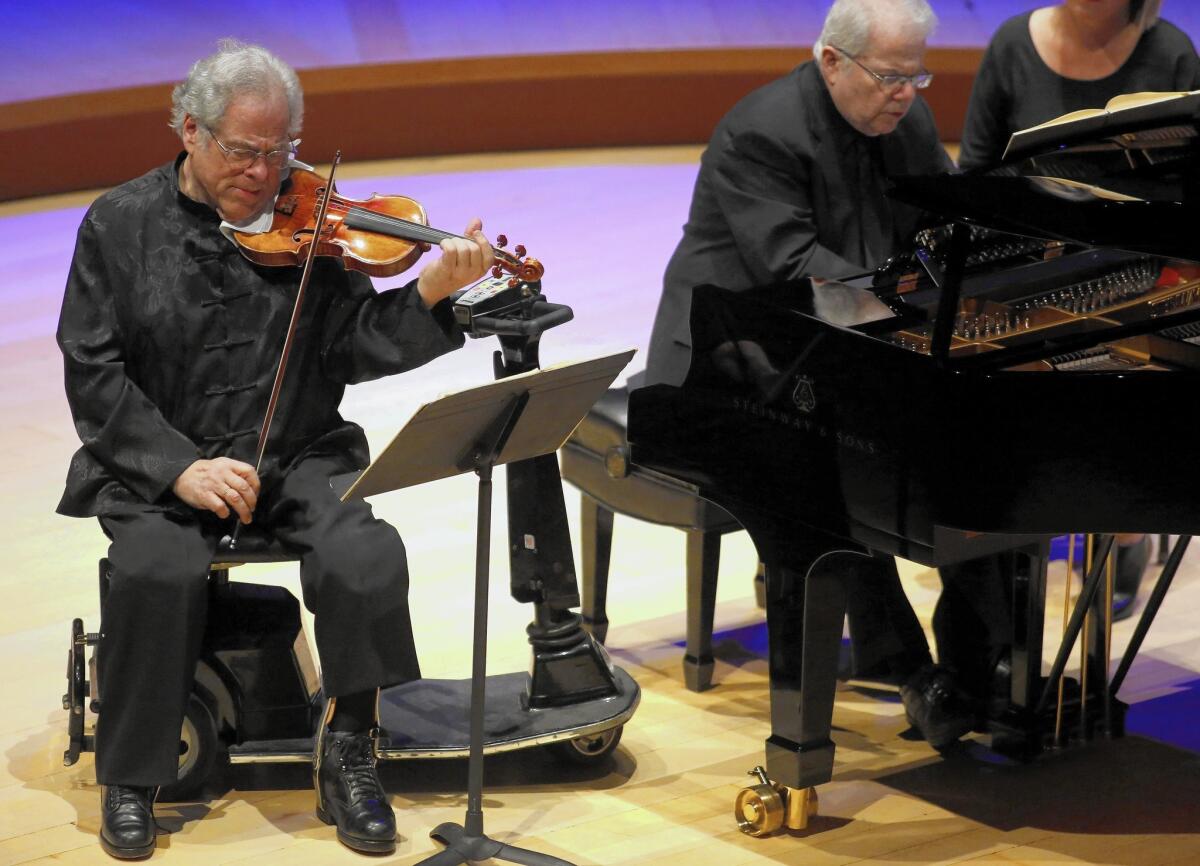Review: Itzhak Perlman revisits moments of early greatness with pianist Emanuel Ax

- Share via
In 1972 at the Dorothy Chandler Pavilion, Jascha Heifetz gave his last public recital. Widely acclaimed as the greatest violinist of the 20th century, he was 71 and age had caught up with him. It was time for a new generation.
That new generation had been ready for while. In my youth I worshiped Heifetz like a god. Then shortly before Heifetz’s final recital, I heard a twentysomething Itzhak Perlman play Berg’s Violin Concerto. I was convinced the next world’s greatest violinist had already arrived.
Perlman turns 71 this August, and Tuesday night he appeared at Walt Disney Concert Hall with pianist Emanuel Ax in a recital program eerily similar to the one Heifetz had given across the street more than 40 years earlier. Both featured Richard Strauss’ Violin Sonata. Heifetz played Franck’s Francophile Violin Sonata, written in 1878; Perlman chose Fauré’s First Violin Sonata, a hit in Paris a year later. Perlman began with a Mozart sonata; both violinists ended with a selection of bonbons.
Perlman has not indicated that he will be retiring, but he is not likely to continue as a soloist for much longer. Two gigantic CD sets — his complete recordings on Warner and on Deutsche Grammophon — came out recently and appear valedictory. Like Heifetz did at the end of his career, Perlman has become deeply invested in teaching, having founded the Perlman Music Program for budding string players. He has also taken up conducting, and he will be leading the Los Angeles Philharmonic this weekend.
I was not looking forward to Tuesday’s concert. No musician has ever disappointed me quite as much as Perlman. He’s got the chops to play anything. He has no doubt given an amazing number of amazing concerts and made lastingly great recordings. He has an easy way with the public, and he is loved by his fans. (Disney Hall was full if not overflowing onto the stage.) His career is all the more an inspiration by being accomplished despite crippling polio.
But Perlman has not grown as an artist. His weakness for celebrity has kept him from advancing an art form. He collects exorbitant fees and, in his later years, too often phoned it in. His repertory, once interesting, has long lacked curiosity. The musicality is still there, but the technique began to suffer years ago. For quite a while, I’ve done my best to avoid him.
I’m happy to report that something of the old Perlman is back. This was, for the most part, a serious and relatively substantial recital, even if it relied on pieces by young composers who went on to write much deeper music. (Mozart and Strauss were in the their early 20s when they wrote their sonatas, Fauré a decade older.)
With Ax at the keyboard, the evening wasn’t just about Perlman but a bracing collaboration between two longstanding colleagues and friends. In each of the sonatas, the pianist set the tone, a grand and glowing and flowing one that was a challenge to the violinist.
Indeed, Ax dominated Mozart’s Sonata in C Major, K. 297, which is how it should be, the violin more often than not assuming an accompanimental role. This gave Perlman — thin and gruff of tone here — time to warm up. But the spirit was there.
The warming up was progressive, continuing through Fauré’s ingratiatingly tuneful sonata. (A new recording of that First Violin Sonata and Strauss’ Violin Sonata with Perlman and Ax is less rough but no less grand than Tuesday’s performance.)
The Strauss, after intermission, was magisterial. Here Perlman rose to the occasion. Intonation continued to slip but barely, and by the end the violin soared above Ax’s big, glorious piano sound. Perlman has triumphed against physical adversity his whole life. For a few minutes, he encapsulated that triumph, now against declining technical ability and, frankly, against too much time wasted in the pursuit of gratuitous musical rewards.
The four bonbons at the end were, alas, gratuitous. Fritz Kreisler’s “Schön Rosmarin” and “Liebesfreud” provided the schlock factor. Small movements from larger pieces by Dvorák and Schumann were played as though sweetly sung. Good-natured jostling between Perlman and Ax kept the mood light.
Heifetz left the stage in 1972 more meaningfully, with short pieces mainly by his contemporaries, many of whom he had championed. Perlman has done far less of that kind of thing. But he did premiere telling music, especially a sensational violin concerto by Earl Kim, a Californian who studied with Schoenberg. The concerto deserves a revival, and I hope Perlman passes it on to his students as he paves the way for a next generation, one that will need to take a hard look at what a great violinist has achieved — and also the paths toward profundity that he avoided.
Still, it is more than a little heartening to have Perlman once more playing like he cares. He came into this business as a class act. It’s not too late for him to surprise us and leave that way too.
------------
Itzhak Perlman and the Los Angeles Philharmonic
Where: Walt Disney Concert Hall, 111 S. Grand Ave., Los Angeles
When: 8 p.m. Thursday and Saturday, 11 a.m. Friday, 2 p.m. Sunday
Tickets: $26.50-$213.50
Info: (323) 850-2000, www.laphil.org
More to Read
The biggest entertainment stories
Get our big stories about Hollywood, film, television, music, arts, culture and more right in your inbox as soon as they publish.
You may occasionally receive promotional content from the Los Angeles Times.











